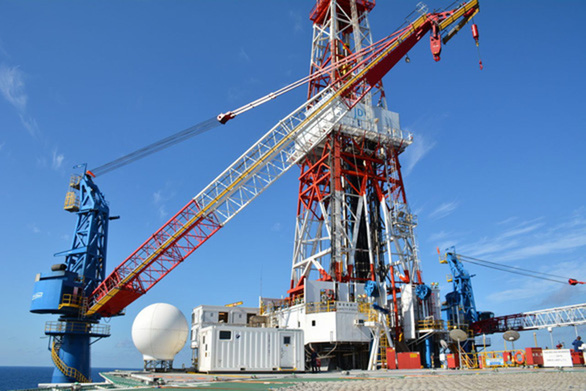That the Chinese survey ship Haiyang Dizhi 8 and its escorts have blatantly disrupted and interfered with Vietnam’s economic activities has caused concerns about regional security.
The Chinese ships’ illegal moves in the waters inside Vietnam’s Exclusive Economic Zone and Continental Shelf near the Tu Chinh – Vung May (Vanguard Bank – Rifleman Bank) region since July 3 until now has compromised energy security and the free energy market in the short and long run.
Impact on oil supply
The East Vietnam Sea potentially has vast resources of oil and gas. The U.S. Energy Information Administration estimates that the sea “contains approximately 11 billion barrels of oil and 190 trillion cubic feet of natural gas in proved and probable reserves.” And the Vanguard Bank is located in an area rich in these natural resources, to the west of Vietnam’s Truong Sa (Spratly) archipelago.
The reserves can meet the rising demand for energy in Southeast Asia.
Benjamin Sovacool, director of the Danish Center for Energy Technology, wrote that in the Asia-Pacific region demand for energy was projected to grow 2.4 percent (against a global average of 1.5 percent) and reliance on oil would rise from 57.5 percent to 66.4 percent between 2005 and 2030.
During the past decade, Vietnam has become an important producer of oil in Southeast Asia. Vietnam has sped up the exploration of oil sources, allowed foreign energy companies to pour in more investments, and cooperated with them in tapping its resources.
However, China’s efforts to disrupt and hinder relevant parties’ oil and gas activities, especially Vietnam’s, in the East Vietnam Sea will adversely affect oil supply and energy security in the region.
China has tried every way to interfere with Vietnam’s oil and gas exploration, from cutting its survey ship’s cables to pressuring the country and obstructing the implementation of its exploitation agreements.
Most recently, China has sent the survey ship Haiyang Dizhi 8 and the heavily armed Coast Guard vessel 35111 to carry out provocative actions around Japan’s oil rig Hakuryu-5 at Block 06-01 belonging to the Nam Con Son Basin project, Vietnam’s joint venture with Russia, which is proof of the Chinese side’s destructive behaviors and which could cause consequences for the oil supply of Vietnam as well as the region.
Obstructing oil transport route
Not only is Vietnam’s oil supply seriously disrupted but the probability of a conflict would threaten maritime routes, particularly the shipping of oil through the region.
The East Vietnam Sea is part of the world’s arterial waterway connecting the Indian Ocean to the Pacific Ocean. Over 200 ships sail through the Malacca Strait every day, translating into 63,000 vessels a year, which transport 80 percent of the oil shipped to Northeast Asia. The shipments are estimated to amount to 525 million metric tons, worth a combined US$390 billion.
Besides, estimates show that Asia’s crude oil imports will rise to 31 million barrels a day in 2030 from 19 million barrels a day in 2014.
Ships from Japan, Australia, China, South Korea and Southeast Asian countries would have to take a detour around the South Australia route, leading to a five-fold transport cost.
This means regional countries will likely face an energy crisis if there is any hindrance to maritime routes. Soaring energy demand and shipping costs would cause oil prices to fluctuate, which would in turn affect the free oil market.
Statistics indicate the importance of maintaining peace and security in the East Vietnam Sea to ensure stable oil supply and smooth shipping routes. Any detrimental effect on the aforementioned activities would disturb the demand and supply balance of the regional energy system.
Therefore, it is critical that China stop all disruptive actions, withdraw all ships from the Vietnamese waters, and refrain from any escalation that may elevate the risk of a regional energy crisis.
* This is the translation of a Vietnamese article written by Minh Trang and Quynh Nhu, from the international relations department of the Ho Chi Minh City University of Social Sciences and Humanities, and published in the Tuoi Tre (Youth) Daily on July 25, 2019.
Like us on Facebook or follow us on Twitter to get the latest news about Vietnam!



















































